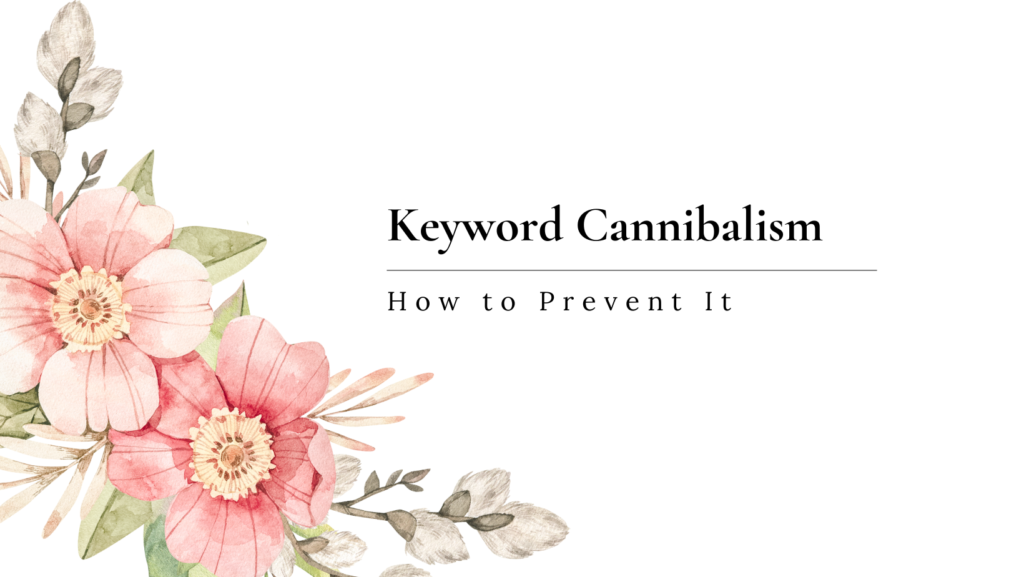If you’ve been looking into SEO for any amount of time, you might have heard of the term “Keyword Cannibalism”. This concept is something that can tank your ranking on Google and is something that you need to be aware of when you are working on your SEO. In this blog post we will talk about what keyword cannibalism is, and why it is important to take it into consideration in your SEO strategy.
What is Keyword Cannibalism?
Keyword cannibalism, in essence is when you have two or more web pages optimized for the same or similar keywords. Google’s algorithm will crawl each web page and will try to rank each page based on how relevant it is for certain topics. This is usually a good thing, but the problem arises when two or more of your website pages are optimized for the same keywords, with the same intent behind the page. (Such as two similar pages teaching you how to identify and correct keyword cannibalism.)
This usually happens by accident, usually if you have two blog posts that are similar, or if you are optimizing your homepage for similar keywords as your service page. Another common mistake that some businesses might make is to optimize all their blog posts for their main home page keyword. As an example, a photographer adding “Chicago Wedding Photographer” to all the blog posts of weddings they have done.
The Impact of Keyword Cannibalism
Although it might seem like adding the same keywords to all pages of your site might give Google a good clue as to what your site is about, the opposite is true. When Google is looking at a website, they are looking at each webpage individually, and ranking them individually.
Google is trying to find the one page in all of the internet that has the most authority to speak on a topic. When Google comes across your website and starts looking at all the pages, it wants to find the page on that website that is going to most relevant for whatever search term. If Google is crawling your website and sees that you have multiple pages on the same topic, optimized for the same keyword, it might assume that neither of those pages contains all of the information their users want because you have multiple pages on that subject, thus decreasing both pages authority and decreasing your ranking. It also is confused as to which page is more relevant, and therefore might decide not to rank either in the search results.
The goal is to make each page as clear as possible for what keyword you want it to rank for, and to not have your keywords competing or ‘cannibalizing’ each other.
Identifying Keyword Cannibalism
Now that we know what keyword cannibalism is, we need to take some steps to ensure that we don’t have any web pages that are suffering from it. If your website is smaller, you might be able to quickly tell if you have similar content on similar pages. If you have a larger website, it might be harder to find issues, but you can use a program like SEMRush to easily identify duplicate keywords.
Once you identify which web pages might be duplicates, you can adjust accordingly. Changing keywords on specific pages to be their own unique page and combining duplicate/similar posts will help you to get your website to rank better for those specific keywords.
Preventing Keyword Cannibalism
Once you have taken the time to identify and correct any current cannibalism on your website, it’s important to continue to keep it in mind with future blog posts and plan accordingly. Finding a way to keep track of your keywords that works for you is key in your success.
Perhaps you create a spreadsheet with all your keywords and which page is optimized for that keyword. That way, when you are going through and trying to find new keywords, you have an easy place to reference all that information. Maybe you keep track of this in a program such as Clickup, or maybe you have it written down in a document. Whatever works best for you, just make sure that you are keeping track somewhere.
In Conclusion
It is important to keep track of your keywords on your website. Because Google values new content, it is important to continue to produce it regularly, but it is even more important to ensure that we are not repeating keywords in our new content. By taking time to really go through our current content and ensure that it’s not trying to compete with itself, we can become more successful ranking on Google, and get more traffic and leads to our business.

